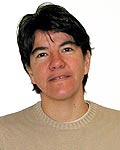 |

|
 |
Prof. Sennur Ulukus |
|
Prof. Sennur Ulukus (ECE/ISR) has been awarded a new National Science Foundation (NSF) grant for her research, titled ?Delay Minimization in Wireless Networks.? The grant will provide $250,000 in funding over three years.
Traditional information theory investigates transmission problems from a physical layer perspective. Information theory aims to determine largest achievable communication rates between transmitters and receivers for a given physical communication channel. In the simplified source-channel-destination model, information-theoretic approaches assume the availability of an infinite number of bits at the transmitters before the transmission starts. The burstiness of the arrivals and the associated issue of delay are mostly ignored. In contrast, network theory gives sophisticated analysis of network layer issues, such as random arrivals and network delay. However, in network-theoretic approaches, the underlying physical layer model is usually very simplified, e.g., in most approaches simultaneous transmissions are not allowed, and even when they are allowed, a collision channel model is used, which is far too simplistic to capture what can be achieved in the physical layer from an information-theoretic perspective.
This project aims to develop a fundamental understanding for the issue of delay in networks, and design transmission methods and scheduling algorithms to minimize delay in network communications. Towards this goal, this project combines techniques from information theory, network theory, queueing theory and optimization theory. The investigators use information-theoretic techniques to improve the underlying information carrying rates, together with queueing- and network-theoretic tools to allocate these rates to network users considering external arrival rates and current queue sizes. Further, the investigators incorporate physical layer phenomena such as fading (enabling opportunistic transmissions) and overheard information (enabling cooperation) into this development. In addition, in networking applications where nodes are able to harvest energy from nature, the investigators consider the interactions between the random packet arrivals and the random energy arrivals (through harvesting) to nodes, in designing the transmission and scheduling mechanisms.
For more information, visit the NSF website.
August 28, 2010
|

